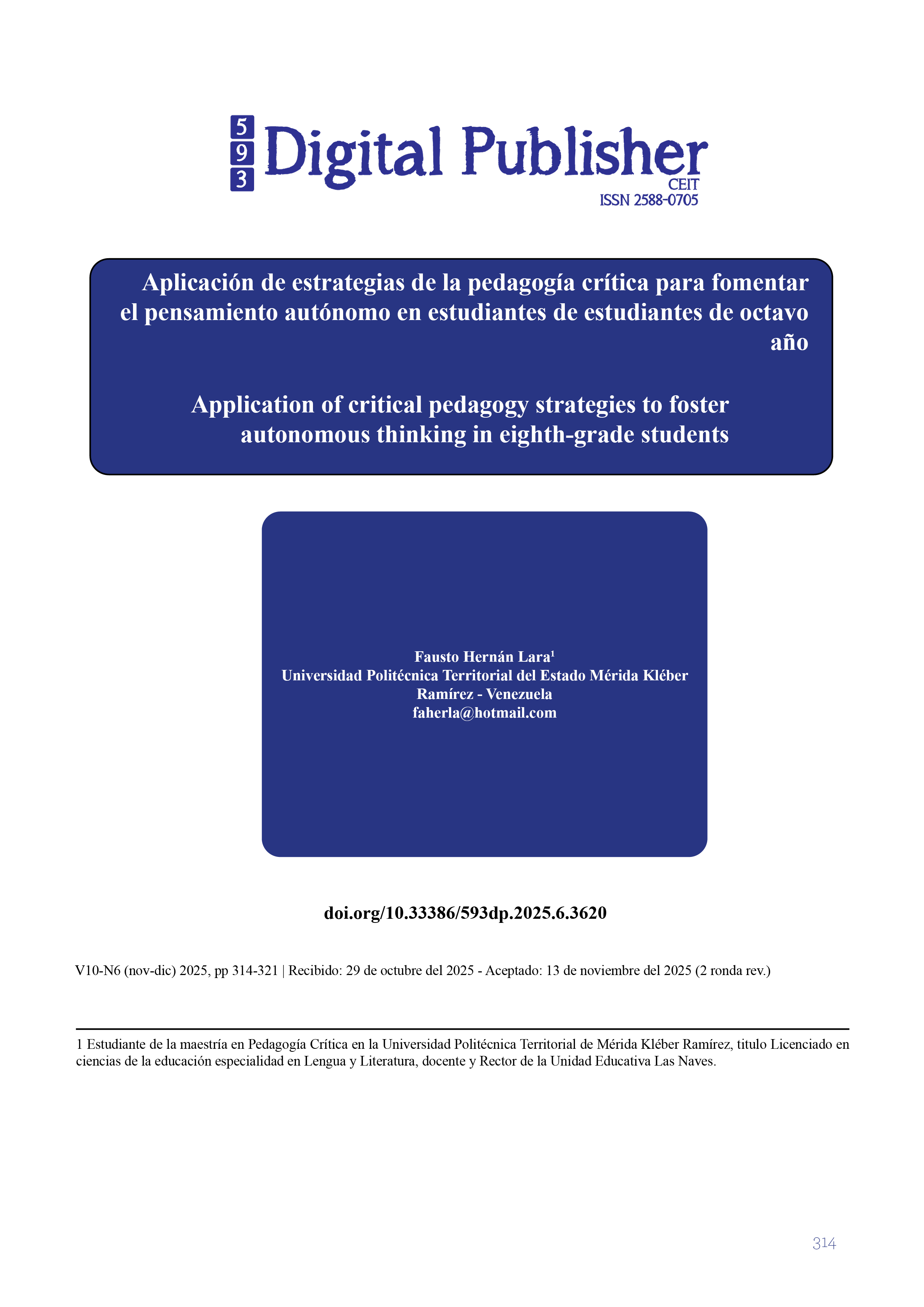Application of critical pedagogy strategies to foster autonomous thinking in eighth-grade students
Main Article Content
Abstract
The study aimed to apply critical pedagogy strategies to foster autonomous thinking in eighth-grade basic education students, recognizing the teacher’s role and the main challenges of its implementation. An interpretive qualitative approach was adopted, using a documentary and field design based on a systematic review of recent academic sources and direct observation of teaching practices at the “Dr. José Baquerizo Maldonado” Educational Unit. Data were collected through validated surveys and observation guides, and thematic content was analyzed through coding, interpretation, and synthesis. The results showed that critical pedagogy promotes active participation, reflection, and informed decision-making, strengthening students’ intellectual autonomy and social awareness. Likewise, facilitating factors such as teacher training and curricular flexibility were identified, along with limitations associated with traditional models focused on information transmission. It is concluded that critical pedagogy is an effective pathway for transforming education toward a more reflective, humanistic, and participatory model. It is recommended to strengthen teacher training, promote interdisciplinarity, and consolidate a democratic school culture that fosters critical and autonomous thinking, contributing to the construction of an inclusive and socially committed educational system.
Downloads
Article Details

This work is licensed under a Creative Commons Attribution-NonCommercial-ShareAlike 4.0 International License.
1. Derechos de autor
Las obras que se publican en 593 Digital Publisher CEIT están sujetas a los siguientes términos:
1.1. 593 Digital Publisher CEIT, conserva los derechos patrimoniales (copyright) de las obras publicadas, favorece y permite la reutilización de las mismas bajo la licencia Licencia Creative Commons 4.0 de Reconocimiento-NoComercial-CompartirIgual 4.0, por lo cual se pueden copiar, usar, difundir, transmitir y exponer públicamente, siempre que:
1.1.a. Se cite la autoría y fuente original de su publicación (revista, editorial, URL).
1.1.b. No se usen para fines comerciales u onerosos.
1.1.c. Se mencione la existencia y especificaciones de esta licencia de uso.
References
Ainscow, M., & Miles, S. (2020). Inclusive education in the post-COVID era: Challenges and opportunities. International Journal of Inclusive Education, 24(14), 1527–1545. https://doi.org/10.1080/13603116.2020.1848493
Ayre, M., Gómez, S., & Duarte, C. (2022). Qualitative rigor in community-based educational research. Educational Review, 74(6), 1123–1140. https://doi.org/10.1080/00131911.2021.1998709
Boysen, J. (2022). Critical pedagogy and early childhood education: Building agency through play and dialogue. Early Years, 42(4), 485–501. https://doi.org/10.1080/09575146.2020.1848792
Braun, V., & Clarke, V. (2022). Thematic analysis: A practical guide for researchers. Qualitative Research in Psychology, 19(3), 438–460. https://doi.org/10.1080/14780887.2020.1769238
Darder, A. (2023). Culture and power in the classroom: Educational foundations for the schooling of bicultural students (3rd ed.). Routledge. https://doi.org/10.4324/9781003193835
Ferrarese, L., Bianchi, S., & Conti, M. (2023). Creative practices for inclusive learning: Evidence from art-based interventions in elementary schools. Teaching and Teacher Education, 127, 104–117. https://doi.org/10.1016/j.tate.2023.104117
Gómez, J., & Pérez, R. (2020). Artistic education and social equity: Challenges for teacher training in Latin America. Revista Educación y Pedagogía, 32(83), 75–92. https://doi.org/10.17533/udea.rep.n83a04
Greenland, S. (2022). Educational inquiry and interpretive design in complex contexts. International Journal of Educational Research Open, 15, 100214. https://doi.org/10.1016/j.ijedro.2022.100214
Gutiérrez, C. (2023). Artistic pedagogy as a mechanism for inclusion in Latin American schools. Revista Latinoamericana de Educación Inclusiva, 17(2), 55–72. https://doi.org/10.4067/S0718-73782023000200055
Herrera, D., & Olivares, P. (2023). Transforming traditional pedagogy through artistic inclusion: Case study in Chilean primary schools. Arts Education Policy Review, 124(3), 135–147. https://doi.org/10.1080/10632913.2023.2190281
Mardones, L., & González, F. (2024). Approaches to inclusive collaborative learning in art education in Chile. International Journal of Inclusive Education, 28(5), 980–996. https://doi.org/10.1080/13603116.2023.2205743
Nowell, L., Norris, J., White, D., & Moules, N. (2024). Thematic analysis: Advancing trustworthiness in qualitative studies. International Journal of Qualitative Methods, 23, 16094069231108224. https://doi.org/10.1177/16094069231108224
Rivera, A. (2022). Gestión escolar y participación comunitaria en contextos rurales de América Latina. Revista Educación y Desarrollo Social, 16(3), 55–74. https://doi.org/10.18359/reds.5708
UNESCO. (2023). Informe sobre el estado de la educación en América Latina y el Caribe 2023. UNESCO. https://unesdoc.unesco.org/ark:/48223/pf0000386270
Wang, Y., & Lee, J. (2023). Art-based interventions for inclusive education: A meta-analysis of effects on student engagement and well-being. Arts & Health, 15(2), 223–240. https://doi.org/10.1080/17533015.2023.2210282


